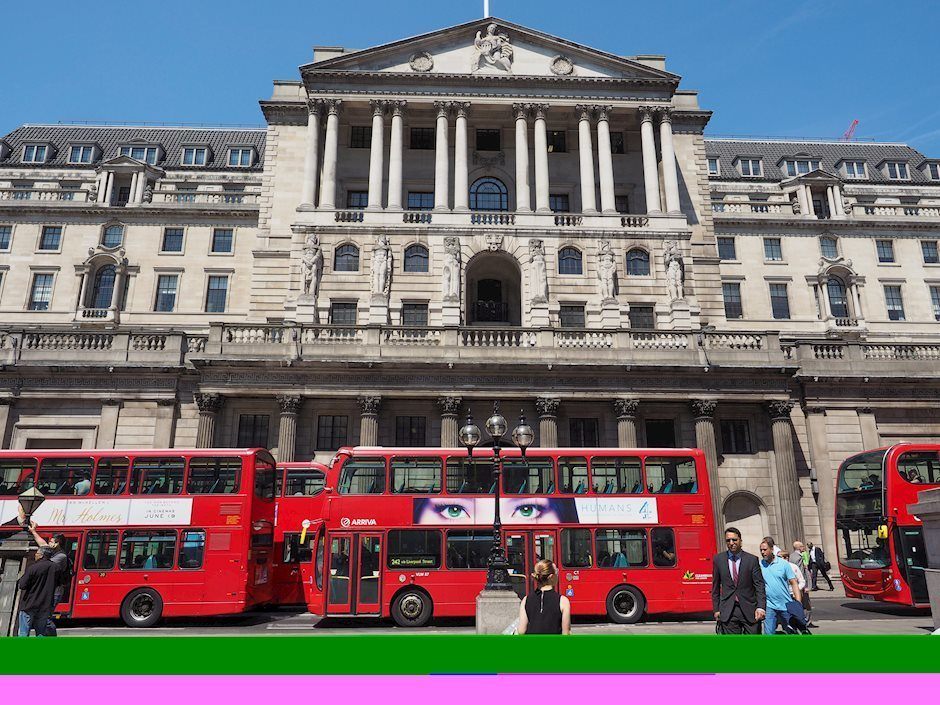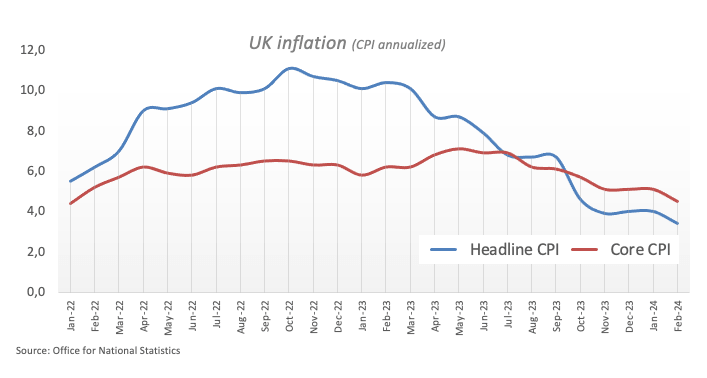BoE keeps rates unchanged, matching the broad consensus

The Bank of England (BoE) matched consensus and left its policy rate unchanged at 5.25% at its event on Thursday, as widely anticipated.
MPC members voted 8-1 to keep rates on hold, as MPC member Dhingra voted to cut rates by 25 bps.
From the bank's statement, monetary policy might retain its restrictive nature despite a reduction in the bank rate. In addition, significant indicators of inflation persistence continue to be high, while the current restrictive policy stance is exerting pressure on the economy, easing the labour market, and suppressing inflationary pressures.
In addition, Governor A. Bailey expressed that we have not reached the stage where we can reduce rates, but he acknowledged that circumstances are progressing in a favorable direction.
Further takeaways from the statement
The Bank of England (BoE) has decided to maintain the guidance provided during its February meeting.
According to the BoE, the policy needs to remain at a sufficiently high level for an adequate duration.
The duration for which the bank rate should stay at its current level will continue to be evaluated.
There are still significant risks, particularly related to developments in the Middle East.
While the labor market is showing signs of loosening, it remains relatively tight.
The staff forecast for Q1 GDP growth is +0.1%, which is consistent with the February forecast. They expect a slight further increase in Q2.
The measures outlined in the Spring Budget are likely to contribute approximately 0.25% to GDP growth over the next few years, although they are expected to have a relatively modest impact on inflation pressures.
Market reaction to BoE event
Following the BoE's interest rate decision, GBP/USD retreated from the area of earlier tops around the 1.2800 region to the 1.2730 zone, where some initial support seems to have emerged.
Pound Sterling price today
The table below shows the percentage change of Pound Sterling (GBP) against listed major currencies today. Pound Sterling was the weakest against the .
| USD | EUR | GBP | CAD | AUD | JPY | NZD | CHF | |
| USD | 0.27% | 0.46% | 0.28% | -0.04% | 0.31% | 0.18% | 1.04% | |
| EUR | -0.24% | 0.21% | 0.05% | -0.29% | 0.04% | -0.05% | 0.79% | |
| GBP | -0.49% | -0.22% | -0.21% | -0.52% | -0.19% | -0.29% | 0.55% | |
| CAD | -0.28% | -0.01% | 0.20% | -0.30% | 0.03% | -0.06% | 0.78% | |
| AUD | 0.03% | 0.31% | 0.51% | 0.32% | 0.33% | 0.23% | 1.07% | |
| JPY | -0.30% | -0.05% | 0.15% | -0.06% | -0.36% | -0.12% | 0.72% | |
| NZD | -0.18% | 0.07% | 0.29% | 0.08% | -0.22% | 0.13% | 0.85% | |
| CHF | -1.07% | -0.80% | -0.60% | -0.79% | -1.11% | -0.76% | -0.89% |
The heat map shows percentage changes of major currencies against each other. The base currency is picked from the left column, while the quote currency is picked from the top row. For example, if you pick the Euro from the left column and move along the horizontal line to the Japanese Yen, the percentage change displayed in the box will represent EUR (base)/JPY (quote).
This section below was published as a preview of the Bank of England rate decision at 07:00 GMT.
- The UK central bank is expected to keep its policy rate unchanged at 5.25%.
- The Bank of England is seen reducing its rates earlier than estimated after softer-than-expected inflation data.
- GBP/USD will closely follow the BoE’s decision as well as the Minutes.
The Bank of England (BoE) is set to hold its policy rate for a fifth meeting in a row on Thursday amidst some recent pick-up in speculation over interest rate cuts by the central bank.
Bank of England predicted keeping the “wait-and-see” mode
The Bank of England is expected to leave the benchmark interest rate unchanged at 5.25% following its policy meeting on Thursday at 12:00 GMT. The bank’s decision on the policy rate will come in tandem with the release of the Monetary Policy Minutes.
While market participants originally expected the BoE to lag both the Federal Reserve (Fed) and the European Central Bank (ECB) in kick-starting their easing cycles, the persistent disinflationary pressures not only accelerated in the UK in February, but also seem to have now underpinned the view of an earlier commencement of the interest rate reductions.
Speaking about inflation, the headline Consumer Price Index (CPI) in the UK rose by 3.4% in the year to February and 4.5% when it came to the Core CPI, that is, excluding food and energy costs.

In fact, these latest UK inflation figures appear to put to the test the insofar “higher for longer” narrative by the BoE. Looking at the upcoming event, a decision to maintain rates unchanged is anticipated to be a done deal, while the central bank is also expected to extend its “wait-and-see” stance and probably drop some cautious tone regarding its inflation outlook.
Still around inflation, the latest BoE’s Decision Maker Panel survey (DMP) indicated that businesses anticipate a decrease in their output price inflation over the upcoming year. Furthermore, one-year ahead CPI inflation expectations declined to 3.3% in February, down from 3.4% in January, while the expected year-ahead wage growth remained steady at 5.2%. In addition, three-year ahead CPI inflation expectations dropped to 2.8% from 2.9%.
BoE’s Governor Andrew Bailey emphasized on March 12 that the pivotal issue revolves around the restrictiveness of policy, adding that the central question is the duration for which this restrictive stance needs to be maintained. He expressed satisfaction with the effectiveness of monetary policy, noting that inflation expectations seem firmly anchored. Additionally, Bailey noted that there has been minimal evidence indicating a rise in unemployment as a prerequisite for inflation reduction, while concerns regarding the entrenchment of second-round effects have diminished.
Ahead of the BoE gathering, analysts at TD Securities said, “We expect the MPC to hold its Bank Rate at 5.25% and leave key guidance largely unchanged, with a wait-and-see message. There's scope to soften the language around underlying inflation, but little else should change”.
How will the BoE interest rate decision impact the GBP/USD?
In light of the latest inflation figures, the probability of a hawkish hold by the central bank now looks markedly dwindled. That said, an outcome in line with market expectations should leave the Pound Sterling (GBP) trading within its familiar ranges, or even spark some fresh bouts of weakness in the very near future.
In that case, GBP/USD could decisively break below the key 200-day SMA at 1.2592, allowing for extra selling pressure to kick in. “Further losses could see Cable revisit the 2024 low of 1.2518 recorded on February 5," notes FXStreet Senior Analyst Pablo Piovano. Pablo adds that “a sustained breach of the latter is not contemplated for the time being, as it would involve a bigger deterioration of the currency’s outlook.”
On the upside, Pablo points at “the initial resistance at the YTD peak of 1.2893 (March 8). The surpassing of this level could prompt GBP/USD to embark on a move to, initially, the psychological 1.3000 yardstick.”
Economic Indicator
United Kingdom BoE Interest Rate Decision
The Bank of England (BoE) announces its interest rate decision at the end of its eight scheduled meetings per year. If the BoE is hawkish about the inflationary outlook of the economy and raises interest rates it is usually bullish for the Pound Sterling (GBP). Likewise, if the BoE adopts a dovish view on the UK economy and keeps interest rates unchanged, or cuts them, it is seen as bearish for GBP.
Read more.Interest rates FAQs
Interest rates are charged by financial institutions on loans to borrowers and are paid as interest to savers and depositors. They are influenced by base lending rates, which are set by central banks in response to changes in the economy. Central banks normally have a mandate to ensure price stability, which in most cases means targeting a core inflation rate of around 2%. If inflation falls below target the central bank may cut base lending rates, with a view to stimulating lending and boosting the economy. If inflation rises substantially above 2% it normally results in the central bank raising base lending rates in an attempt to lower inflation.
Higher interest rates generally help strengthen a country’s currency as they make it a more attractive place for global investors to park their money.
Higher interest rates overall weigh on the price of Gold because they increase the opportunity cost of holding Gold instead of investing in an interest-bearing asset or placing cash in the bank. If interest rates are high that usually pushes up the price of the US Dollar (USD), and since Gold is priced in Dollars, this has the effect of lowering the price of Gold.
The Fed funds rate is the overnight rate at which US banks lend to each other. It is the oft-quoted headline rate set by the Federal Reserve at its FOMC meetings. It is set as a range, for example 4.75%-5.00%, though the upper limit (in that case 5.00%) is the quoted figure. Market expectations for future Fed funds rate are tracked by the CME FedWatch tool, which shapes how many financial markets behave in anticipation of future Federal Reserve monetary policy decisions.
Author

Pablo Piovano
FXStreet
Born and bred in Argentina, Pablo has been carrying on with his passion for FX markets and trading since his first college years.

















